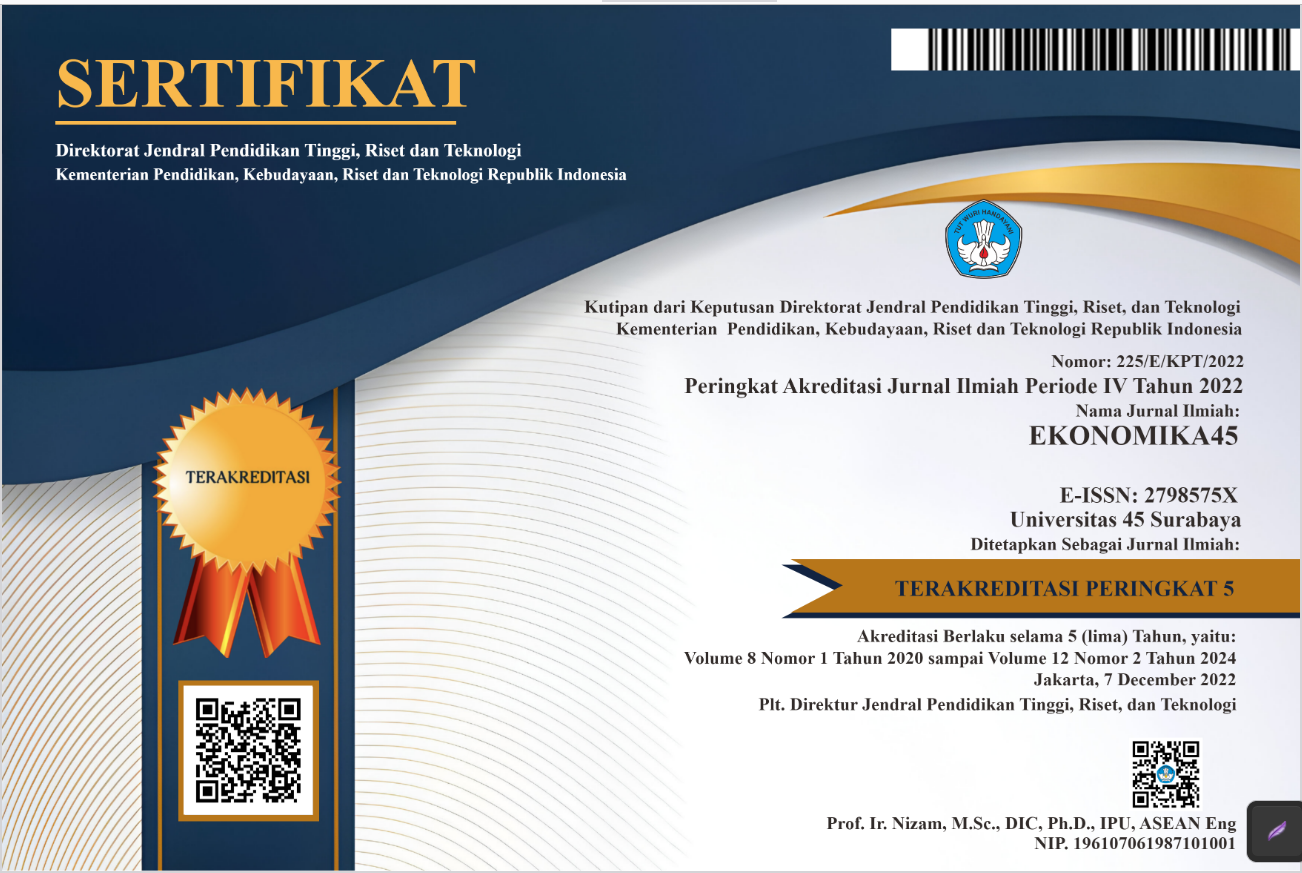The Influence Of Professional Ethics, Professional Skepticism, And Auditor Competence On Auditor Quality Moderated By Auditor Experience
DOI:
https://doi.org/10.30640/ekonomika45.v12i2.4586Keywords:
Profesional Ethics, Profesional Skepticism, Auditor Competence, Auditor Quality, Auditor ExperienceAbstract
This study aims to analyze the influence of Profesional ethics, Profesional skepticism, and auditor competence on auditor quality with auditor experience as a moderating variable. Auditor quality is seen as an important indicator in measuring the quality of audits that provide trustworthy integrity of financial report information. This research uses questionnaire data from auditors in DKI Jakarta, during the period of the writing. The Partial Least Squares (PLS) analysis method is used to test the relationships between the variables under study. The results of this research are expected to provide valuable insights into how Profesional ethics, Profesional skepticism, and auditor competence influence auditor quality, as well as how auditor experience can moderate the relationships between these variables. The implications of this research are expected to assist management decision-making in determining the Public Accounting Firm to carry out audit assignments so that the resulting audited financial reports can be trusted for their integrity.
References
Arens, A. A., Elder, R. J., & Beasley, M. S. (2018). Auditing dan jasa assurance: Pendekatan terintegrasi (Edisi ke-1). Erlangga.
Aziz Sholeh, A., et al. (2024). Kompensasi terhadap motivasi kerja karyawan pada PT. Insolent Raya di Surabaya. Journal of Management and Creative Business, 2(1), 82–96.
Cho, M., Kwon, S. Y., & Krishnan, G. V. (2021). Audit fee lowballing: Determinants, recovery, and future audit quality. Journal of Accounting and Public Policy, 40(4). https://doi.org/10.1016/j.jaccpubpol.2020.106787
DeAngelo, L. E. (1981). Auditor size and audit quality. Journal of Accounting and Economics, 3, 183–199.
Dewita, T. H., & NR, E. (2023). Pengaruh audit tenure, rotasi audit, dan fee audit terhadap kualitas audit. Jurnal Eksplorasi Akuntansi, 5(1), 370–384. https://doi.org/10.24036/jea.v5i1.627
Eisenhardt, K. M. (1989). Agency theory: An assessment and review. Academy of Management Review, 14(1), 57–74.
Fau, A. M. M., Siagian, P., & Sitepu, W. R. B. (2021). Pengaruh etika profesi, kompetensi dan integritas auditor terhadap kualitas audit (Studi empiris pada kantor akuntan publik di Kota Medan). Owner, 5(2), 268–282. https://doi.org/10.33395/owner.v5i2.391
Francis, J. R. (2004). What do we know about audit quality? British Accounting Review, 36(4), 345–368. https://doi.org/10.1016/j.bar.2004.09.003
Hamdiah, C., Riza, A., Maryam, C., Rusmina, R., & Abdullah, Z. (2023). Pengaruh skeptisisme profesional, beban kerja dan pengalaman audit terhadap kemampuan auditor dalam mendeteksi kecurangan (Studi empiris pada kantor akuntan publik di Kota Banda Aceh). JEMSI (Jurnal Ekonomi, Manajemen, dan Akuntansi), 9(1), 73–85. https://doi.org/10.35870/jemsi.v9i1.912
Hamid, A. F. (2019). Faktor-faktor yang mempengaruhi kualitas audit. Jurnal Ilmiah Mahasiswa FEB.
Heider, F. (1958). Perceiving the other person. In The psychology of interpersonal relations (pp. 201–220). John Wiley & Sons Inc. https://doi.org/10.1037/10628-002
Hurtt, R. K. (2010). Development of a scale to measure professional skepticism. Auditing: A Journal of Practice & Theory, 29(1), 149–171. https://doi.org/10.2308/aud.2010.29.1.149
Indrawijaya, L., Kuntadi, C., & Abstract, D. (2023). Pengaruh independensi, fee audit, dan kompetensi auditor terhadap kualitas audit (Studi kasus pada kantor akuntan publik di wilayah Kota Bekasi). Jurnal Ilmiah Wahana Pendidikan, 2023(4), 570–578. https://doi.org/10.5281/zenodo.7684764
Jensen, M. C., & Meckling, W. H. (1976). Theory of the firm: Managerial behavior, agency costs and ownership structure. Journal of Financial Economics, 3(4), 305–360.
Kristiawati, et al. (2019). Citra merek, persepsi harga dan nilai pelanggan terhadap keputusan pembelian pada mini market Indomaret Lontar Surabaya. Jurnal Ilmu Ekonomi dan Manajemen (JMM 17), 6(2), 27–36.
McShane, S. L., & Von Glinow, M. A. (2015). Organizational behavior (7th ed.). McGraw-Hill.
Ningsih, N. S. A., Kirana, D. J., & Andriyanto, W. A. (2020). Pengalaman audit, fee audit, dan akuntabilitas terhadap kualitas audit. Prosiding BIEMA: Business Management, Economic, and Accounting National Seminar, 1.
Novrilia, H., Arza, F. I., & Sari, V. F. (2019). Pengaruh fee audit, audit tenure, dan reputasi KAP terhadap kualitas audit. Jurnal Eksplorasi Akuntansi, 1(1), 256–276. http://jea.ppj.unp.ac.id/index.php/jea/issue/view/2
Pramawastika, E., & Primasari, N. H. (2023). Analisis determinan yang memengaruhi kemampuan auditor dalam mendeteksi kecurangan. Akuntansiku, 2(1), 1–10.
Pulungan, N. S. E. M. (2020). Faktor–faktor yang mempengaruhi kinerja auditor. Jurnal Manajemen dan Akuntansi Medan.
Rahayu, N. K. S., & Suryanawa, I. K. (2020). Pengaruh independensi, profesionalisme, skeptisisme profesional, etika profesi dan gender terhadap kualitas audit pada KAP di Bali. E-Jurnal Akuntansi, 30(3), 686–699. https://doi.org/10.24843/eja.2020.v30.i03.p11
Riofuku, A. (2023). Etika pemadam kebakaran ditinjau dari etika deontologis Immanuel Kant dan etika tanggung jawab Emmanuel Levinas. Jurnal Dekonstruksi, 9, 114–121.
Robbins, S. P., & Judge, T. A. (2013). Organizational behavior (15th ed.). Pearson.
Sari, K. G. A., Wirakusuma, M. G., & Ratnadi, N. M. D. (2018). Pengaruh skeptisisme profesional, etika, tipe kepribadian, kompensasi, dan pengalaman pada pendeteksian kecurangan. E-Jurnal Ekonomi dan Bisnis Universitas Udayana, 7(1).
Sekaran, U. (2016). Research methods for business: A skill building approach (7th ed.). John Wiley & Sons.
Setiawan, R., & Suharsono. (2018). Pengaruh kualitas audit, debt default dan pertumbuhan perusahaan terhadap penerimaan opini audit going concern. Jurnal Ilmiah Ilmu Akuntansi, Keuangan dan Pajak. http://ejournal.stiewidyagamalumajang.ac.id/index.php/asset
Spencer, P. (2011). Surviving your teaching practice. McGraw-Hill Education (UK).
Suharti, & Apriyanti. (2019). Pengaruh kompetensi dan independensi terhadap kualitas audit dengan etika auditor sebagai variabel moderasi. Jurnal Ilmiah Akuntansi, 208(2). http://www.ejournal.pelitaindonesia.ac.id/ojs32/index.php/BILANCIA/index
Vika Frassasti, N. W. R. W. N. (2023). Pengaruh independensi, pengalaman auditor, skeptisisme profesional, beban kerja dan kompetensi terhadap kemampuan auditor mendeteksi kecurangan laporan keuangan. Jurnal Akuntansi dan Keuangan (JAK).
Wardhani, A. A. I. T. W., & Astika, I. B. P. (2018). Pengaruh kompetensi, akuntabilitas dan independensi pada kualitas audit dengan etika auditor sebagai variabel moderasi. E-Jurnal Akuntansi, 31(1). https://doi.org/10.24843/eja.2018.v23.i01.p02
Xiao, T., Geng, C., & Yuan, C. (2020). How audit effort affects audit quality: An audit process and audit output perspective. China Journal of Accounting Research, 13(1), 109–127. https://doi.org/10.1016/j.cjar.2020.02.002
Downloads
Published
How to Cite
Issue
Section
License
Copyright (c) 2025 EKONOMIKA45 : Jurnal Ilmiah Manajemen, Ekonomi Bisnis, Kewirausahaan

This work is licensed under a Creative Commons Attribution-ShareAlike 4.0 International License.









